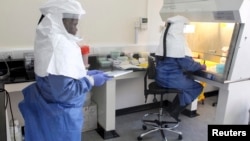Uganda, which has a history of containing Ebola outbreaks, has sent 20 of its experts to Sierra Leone and Liberia to help curb the spread of the disease. The current Ebola outbreak in West Africa is the largest ever. Late Monday, the World Health Organization (WHO) said there have been at least 1,013 deaths.
West Africa has a new partner in the fight against the Ebola outbreak. Uganda’s Ministry of Health, in coordination with the WHO, has sent 20 of Uganda’s top health experts to West Africa.
Their specializations include epidemiology, case management, community education and psychosocial support. They flew to Sierra Leone and Liberia late last month to assist the overburdened governments in containing the disease.
Uganda has experience fighting Ebola with four major outbreaks in the past 10 years, all of which were contained.
During the last Uganda outbreak in 2012, public health initiatives, including recommendations by President Yoweri Museveni and the Ministry of Health, targeted social interactions.
Warnings were sent out daily, reminding people to avoid shaking hands, kissing and engaging burial rituals that included touching the body. Diagnostic testing was also improved, to more efficiently identify Ebola patients, while training for health workers and protective gear was supplied.
The WHO is hoping Uganda’s experts can bring a similar approach to the current outbreak in West Africa.
Doctor Solomon Fisseha, who is working on the project with the WHO in Uganda explains Uganda’s previous successes.
"Uganda has got very good experience on this management of viral hemorrhagic fevers. For example in 2012 we had almost four outbreaks of viral hemorrhagic fevers in four districts, Ebola and Marburg. Since then the country has developed a good capacity. So if you look at the outbreaks that we have in Uganda for the last couple of years we have been able to manage it as early as possible, actually. Without even spread[ing] to neighboring countries," said Fisseha.
This Ebola outbreak has led to multiple border closures, while airline companies have also suspended or restricted flights to the West Africa region.
At the WHO, there is hope that a multifaceted approach will work.
"If you have the surveillance system in place and if you have the experts on the ground, and if you create the environment so that the community understands the risk, rather than trying to hide [they] will come out and inform the health workers and professionals so that appropriate measures can be taken. Because it’s very difficult to identify the patients unless they come in and report to you. So what makes the control very difficult, especially in West Africa, is that it happens for the first time and in a very remote area, and you can really understand the panic that it can create in the community and people will be likely to be resistant, so it will take you some time to convince the community and get them on board," said Fisseha.
The United States is also sending specialists from the Centers for Disease Control and Prevention and the U.S. Agency for International Development. With a multi-national approach underway, health officials hope it will limit the spread of the deadly disease.




